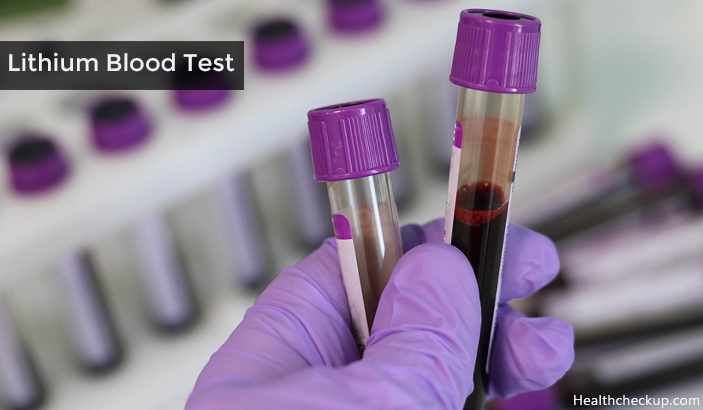What is Lithium Blood Test?
Lithium is a drug used as a mood stabilizer which is effective in the treatment of manic episodes, depressive episodes and maintenance treatment in Bipolar Affective Disorder. The mechanism of action is not clear, but studies have shown that it has effects on “Second Messengers” or “Signaling Molecules” in the neurotransmitter pathways. Lithium is absorbed rapidly from the gastrointestinal system and diffuses throughout the body fluids. Lithium is excreted from plasma by renal excretion.
When a patient is started on Lithium treatment it shouldn’t be discontinued without medical advice. Patients are advised to take the tablet every day at the same time to keep compliance. And if a patient misses one does he should not take two tablets at once to compensate but have to take the usual dose at the correct time.
Lithium has a very narrow therapeutic index, which means the optimum drug level and toxic level are very close together. Thus when a patient is on Lithium treatment it is essential to monitor the drug level in his/her body to avoid drug toxicity. Lithium blood test preparation has to be done correctly before the investigation.
Lithium Blood Test Preparation & Procedure
The lithium blood test or checking lithium level in the body is done by taking a venous blood sample of the patient. The sample is taken 10-12 hours after the last Lithium dose. If the patient is taking Lithium in a twice-daily dose (Bd) he should be advised not to take the morning dose on the day of sample collection. And ask him to come for the investigation 12 hours after the previous day night dose. The patient does not need to be on fasting for this test. When the blood sample is collected serum Lithium level will be measured.
Lithium Blood Test Results And Interpretation
Usually, Lithium is started as a single daily dose of 400-500mg. Until the therapeutic level is achieved serum Lithium level should be checked weekly. Then weekly for three weeks and after achieving the steady state Lithium blood level can be checked for 6 months. If there are clinical indications have to monitor more frequently. During an acute episode of Bipolar Affective Disorder serum Lithium level of 0.8-1.2mmol/L is indicated. And in the maintenance phase, there should be 0.6-0.8mmol/L of drug level in the body.
Since it has a very narrow therapeutic index, when Lithium levels are higher than expected range patient can get symptoms of lithium toxicity. When Lithium level is more than 1.5mmol/L patients can get mild symptoms of toxicity such as vomiting, coarse tremors, drowsiness, ataxia, and blurred vision. If a patient gets hyperreflexia, convulsions, fine tremors and renal failure those will indicate severe lithium toxicity which can lead to cardiac failure, coma, and even death.
In such instances, the drug should be discontinued immediately and the patient should be hospitalized to check serum lithium levels.
Side Effects of The Blood Test
Lithium has several side effects which make the patients stop the drug by themselves. But some of them are temporary and therefore medical officers have the responsibility to educate patients regarding the possible side effects and what measures to be taken by the patient. They can have fine tremors which are not dangerous, but if the patient can’t tolerate it should ask him to consult a doctor without stopping the drug. Another main complaint at the beginning of the treatment is the metallic taste in the mouth. This will subside in a few weeks. If a patient really needs an alternative can go ahead with a different brand of Lithium as well. Also, patients may complain of excessive thirst and dry mouth, where they can be educated to drink plenty of water to reduce them.
Once Lithium is started both patient and doctors have to be cautious when using other medications. Because Lithium has several drug interactions with other common medications. Drugs like Thiazide Diuretics, Non-Steroid Anti Inflammatory Drugs ( Diclofenac Sodium, Ibuprofen, mefenamic acid etc.), ACE inhibitors ( Captopril, Enalapril), Antibiotics ( Metronidazole etc.) will increase the Lithium level in and drugs like Theophylline and Sodium Bicarbonate can reduce the Lithium level in blood when given together. Therefore patients should inform doctors or carry a written document regarding their Lithium treatment at all times.
If Lithium blood test preparation is carried out correctly the test will provide accurate results as well. Monitoring Lithium blood level is essential for the optimum treatment of the patient.
Dr. Somiruwani Nisansala is an MBBS graduate from Faculty of Medicine, University of Sri Jayewardenepura, SriLanka. Studying medicine for years has given her the knowledge and skills on medical writing with latest and most accurate information.









